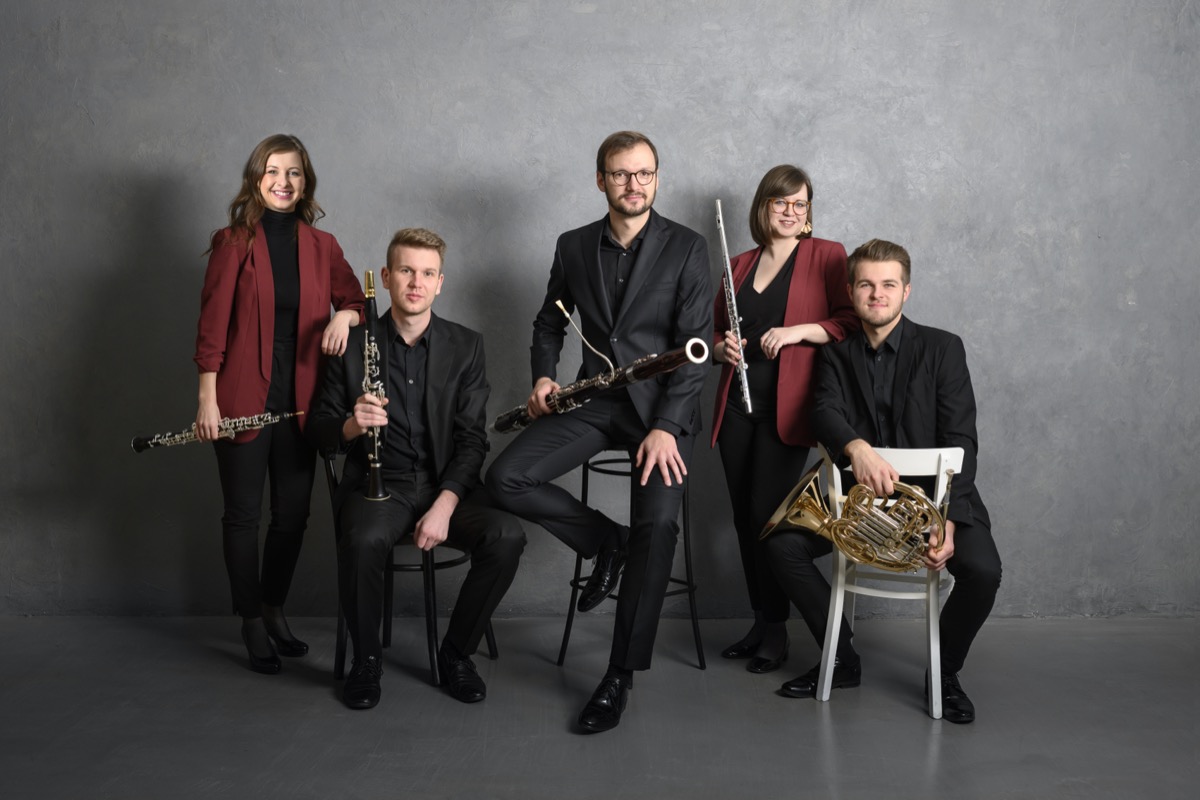ALINDE QUINTET
Five young musicians founded the Alinde Quintet in 2019. The members have studied at prestigious music schools in Prague, Brno, London, Ljubljana, and Brussels, and today they hold positions of leadership in orchestras including the Brno Philharmonic, the Prague Radio Symphony Orchestra, and the Prague Symphony Orchestra. In addition, they have been members of the orchestral academies of the Czech Philharmonic, the BBC Symphony Orchestra, and the English National Opera.
Programme
- Maurice Ravel: Le Tombeau de Couperin
- Pavel Haas: Dechový kvintet op. 10
- Antonín Rejcha: Dechový kvintet D dur op. 91 č. 3
Performers
- Alinde Quintet
- Anna Talácková – flute
- Barbora Trnčíková – oboe
- David Šimeček – clarinet
- Kryštof Koska – French horn
- Petr Sedlák – bassoon
Soon after its founding, the Alinde Quintet drew attention by winning first prize at the BIMC International Wind Quintet Competition in Bucharest. Their most recent successes include third prize at the 2023 Carl Nielsen International Chamber Music Competition in Copenhagen. The quintet members are also laureates of many other competitions. Flautist Anna Talácková won second prize at the 2019 Prague Spring International Music Competition, becoming the first Czech laureate in the flute competition in 38 years.
The ensemble will open its Prague Spring Festival debut with Le Tombeau de Couperin, a suite in which Maurice Ravel paid tribute to the Baroque master. Ravel initially wrote these pieces in old dance forms for piano, then he created brilliant orchestrations of four of the movements. The wind quintet arrangement gives the players a chance to shine and clearly demonstrates the classical purity of the composer’s thinking.

Next comes the Wind Quintet by Pavel Haas. Today, the brother of the famous Czechoslovak actor Hugo Haas is usually identified as one of the Theresienstadt composers, who were imprisoned by the Nazis at the Theresienstadt ghetto because of their Jewish origins and were later murdered in Auschwitz. We could just as easily speak of Haas as having been a Moravian composer. A native of Brno, he was the most prominent pupil of Leoš Janáček and belonged to the Club of Moravian Composers, even serving as the organisation’s director in the 1920s. The Wind Quintet dates from that period and reflects the composer’s complex identity, revealing Janáček’s influence, inspiration from the music of Moravia and of the synagogue, and quoting the patriotic Saint Wenceslas Chorale.
Joseph Haydn was the man behind the creation of the string quartet genre, and the same can be said about Antonín Rejcha and the wind quintet. A Prague native, he lived successively in Vienna, Bonn, and Hamburg, but he finally settled in Paris, where he became a distinguished pedagogue with César Franck, Charles Gounod, and Hector Berlioz numbered among his pupils. He wrote more than twenty wind quintets. The Quintet in D minor, Op. 100, No. 2 dates from the composer’s mature period in Paris. Nearly half an hour long, the composition works with all the instruments equally and makes demands on the players’ virtuosity.








